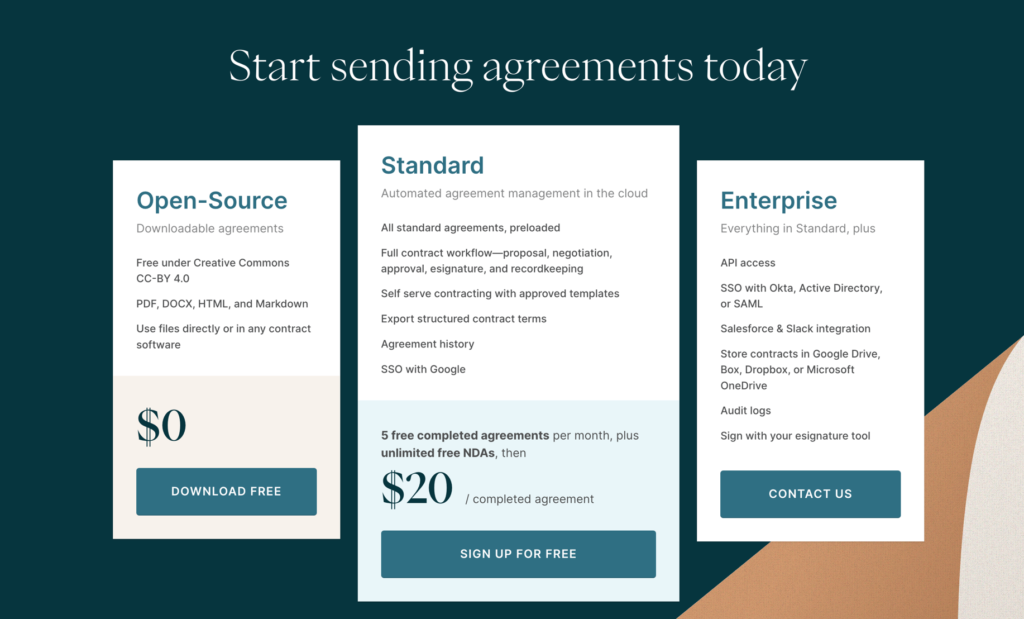
Common Paper, the contract standardisation startup, has launched a ‘SaaS agreement toolkit’ as the movement to normalise commoditised legal documents gathers pace, with peers such as oneNDA and Bonterms also continuing to make an impact.
Common Paper’s Founder and CEO, Jake Stein (pictured), told Artificial Lawyer: ‘When I was running my previous two startups, I found contracts to be incredibly confusing, time-consuming, and costly. We wanted to build a free resource for founders in a similar situation, and offer the fastest, most trustworthy way for SaaS companies to create and understand commercial contracts.’
The toolkit includes two main components:
- A suite of standard agreements including a Mutual NDA, Cloud Service Agreement, Data Processing Agreement, Design Partner Agreement, Service Level Agreement, and Terms of Service. These are all free, released under creative commons, and created by a committee of attorneys. The toolkit organises these contracts into the business problems that SaaS companies have, so that people understand in what situation they’ll need each contract.
- TurboTax-style guides that help founders understand the standard agreements and gives them tools to customise them, step by step. You can see one they offer for the CSA. At the end of the process, users can download the agreement as a Word doc and/or use the software to manage their contract workflow. They will be launching these guides for the other agreements as part of the toolkit.
The company has also published a Benchmark Report based on data from the proposed and signed contracts of more than 150 companies. This provides context on the market trends for different terms and how they influence negotiation, the company explained. For example: 85% of NDAs have a fixed rather than perpetual term of confidentiality, and proposing a perpetual term decreases the odds of a signed agreement by 16%.
I.e. there are plenty of ‘naturally occurring standards’ already there in contracts, meanwhile deviating from them in certain scenarios gains very little for either party. In short, in some cases standardised contracts just make sense.

Artificial Lawyer asked founder and CEO, Stein, some more about his work and the wider world of legal standardisation for contracts.
Do you believe that standardisation will ‘catch on’?
While we have a long way to go, contract standards are already catching on. There are, of course, industries where standards are already dominant, like early-stage startup investing with the SAFE or online ad sales with the IAB Standard Terms. We don’t have anything like that penetration yet in SaaS commercial contracts, but we’ve seen remarkable growth over the past 6 months.
Our standard contracts have been downloaded thousands of times by people in dozens of countries. We’ve also seen the impact that standards can have on sales cycle acceleration, with 63% of contracts signed within 24 hours of proposal and counterparty paper reduced by 47%. With those kinds of results, I’m confident that adoption will continue to grow.
Should different standards companies work together?
We know and think highly of many of the people involved in contract standardisation. Our vision is to turn contracts into APIs, and the creation and adoption of standards are a critical part of achieving it. We’re always excited about collaborating with more people to make that happen. That being said, other folks often have different goals, and that naturally translates to different priorities and projects.
There’s a common misconception that if this is going to work, there can only be one standard. It’s easy to find counterexamples to that. The GPL and Apache licenses are both widely used for open-source software. There are important differences between them that reflect the different philosophies and goals of the organizations that create them. I don’t think anyone would be better off if the two licenses were combined into one.
How complex a contract should be standardised, i.e. before you are really losing important flexibility and detail?
The frequency of the business use case is much more important than complexity for determining if standardisation makes sense. There’s no value in creating a standard for a completely unique situation, even if the subject matter is trivially simple. On the other hand, the ISDA Master Agreement supports incredibly complex financial instruments.
The key thing to do when allowing for complexity within a standard is to accommodate it as structured data. That makes it easier both for people and computers to work with the information within the contracts.
–
Thanks Jake and also thanks for adding your efforts to the standardisation movement!
–
Some additional thoughts from AL.
It is understandable that lawyers are unsure about industry standard documents. After all, lawyers don’t just like to be in control, they operate in an environment where there are plenty of bespoke client needs and being forced into a standard contract when you feel there is loads of customisation needed can be a massive challenge. Artificial Lawyer would say that if you really feel that a standard contract, even with some minor tweaking, just won’t do it for you, then don’t use it. That’s all there is to it. Lawyers are there to protect the interests of their clients, and if you believe a much more bespoke document will really serve your client the best, then take that route.
Likewise, if you are dealing with a legal pathway that has been traversed a million times before by many thousands of companies and their lawyers, and they have broadly started to take the same path in the vast majority of those scenarios and are happy with the outcomes…..then why are you reinventing the wheel, getting bogged down in negotiations for aspects of a contract that are now accepted as ‘the norm’, and creating extra costs for everyone without actually reducing the risks? In fact, one could argue that sometimes doing things from scratch (or near to scratch) will create new risks if you are moving away from industry norms that are generally accepted – unless, as noted, this is needed.
It’s therefore a balancing act and one based on sound judgment. Only you the lawyer can make that judgment, and that’s why we need humans in the loop. But, if you know you are treading an incredibly well-worn path for a very commoditised legal need, then standardisation may well be a compelling solution to your and your clients’ needs.
At least that’s the view of this site. And as said, this will not be the way for all needs, no more than everything in the world can be automated, it’s just a slice of what is a massive and complex environment filled with myriad contracting needs.